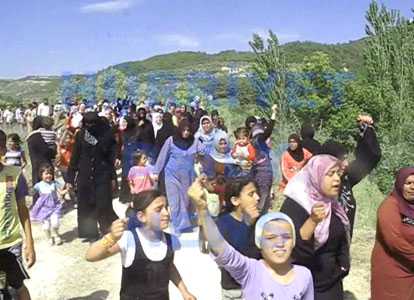Ankara is gradually losing hope and distancing itself from President Bashar al-Assad.
If you look closely, the prime minister is becoming increasingly tough with every statement he makes and the dose of his warnings is increasing. Even though he has not burned bridges like he did with Moammar Gadhafi, a surprise is still expected, the dominant belief is that Assad will not be able to solve the situation easily.
Those talks I have had with people who are the final decision makers on the subject show clearly how serious the situation is.
It is not only that the tensions in Ankara are rising but the viewpoint of Damascus on Turkey is also changing. The embraces and words of fraternity of the past do not exist anymore.
On Syrian State Television, it is now openly said that the weapons of Muslim Brothers are coming from Turkey. Let us not forget that the Muslim Brothers is as dangerous and as much an enemy for the Syrian administration as the outlawed Kurdistan Workers’ Party, or PKK, is for us.
As if this is not enough, a Turkish involvement behind the rebellions and the Antalya meeting of the dissidents is being discussed. Assad has not put forward his stance; he has not put Ankara at his opposing side but, you will see, it is not too far away.
The worst case scenario Ankara fears
The worst case scenario that Ankara fears most and will mobilize it is that the clashes expand to Aleppo and Damascus and the Assad regime decides to react extremely tough and bloody way. The meaning of this is that Assad uses all his military power and the internal conflict transforms quickly into an Alawite-Sunni clash. What is expected as a consequence of this is the flow of tens of thousands of Sunni-Syrians to Turkey. An official I spoke to on this subject said exactly this:
“Turkey has opened its territory for now, but when the figure reaches a point where we cannot handle it then we will have to close the border.”
Now, this is the situation the political power in Ankara worries about the most. The same official continued:
“We would close the border but we cannot turn our backs on neither the Sunnis nor the Alawites. If chaos starts, then we will have to form a security zone or a buffer zone inside Syrian territory.”
In a summit in Ankara recently, this was the scenario discussed.
Robert Fisk wrote about this possibility before and had drawn much criticism, but what he said was true.
Scenarios and preparations are unfolding.
“Military and civilian meetings about the buffer zone and other measures to be taken have increased in recent days. Add to that the invitation of all ambassadors in the Middle East to Ankara. The pressure is building.”
It is not only talk when Ankara says, “all measures have been taken.”
The most dreadful item on the agenda is the formation of a security zone inside Syrian territory that has too many risks and could overthrow the regional equilibrium and for that reason is never a desired option.
But there is not much hope.
Hurriyet
